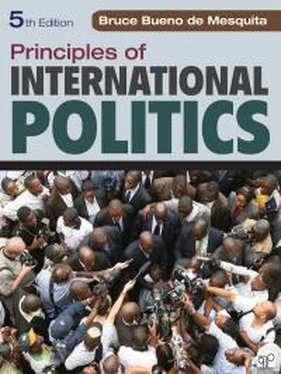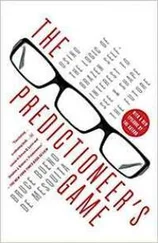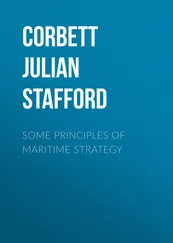solving without audience costs, 215–216
Cromwell, Oliver, 485
Crying wolf syndrome, 259
Cuba, 29, 325, 367, 491
Cuban Missile Crisis, 19–21, 211–215, 218, 499–500
Cultural norms, 25
See also Norms and regime
Currency convertibility, 324, 368
Currency mobility, 359–368
Currency peg, 361 (table), 367
Currency policy, 197–198, 262–263
Currency stability, 366
Customs. See Norms and regimes
Cyprus, 248, 448
Czechoslovakia, 191, 495
Czech Republic, 283
Daimler-Benz Co., 346
DDT pesticide, 348
Deadweight loss, 343
Debt relief, 413
Decision makers, 102 (note 1), 476–477
Decision theory. See Expected utility; Game theory; Median voter theorem
Declaration of Independence, 487
Declarations, 302–304
Decolonization, 498
Deep agreements, 240, 282–284, 287, 303 482
Defection, 90, 92, 94, 142, 144, 219–220, 252, 253, 254
Defense, as public good, 81
Defense budget
bureaucratic politics and, 11, 15, 41
war effort, 234 (figure)–236 (figure)
De Gaulle, Charles, 462
Degenerate theories, 59
Demand and supply, 335–338, 337 (figure)
Demand curves, 337, 338, 340
Democracies
motivations for warfare, 229–230 (table) 65, 93, 384, 413
nation building and, 456–463
war conduct and outcomes, 450–451 (figure)
war-selection calculations, 230–231 (table)
Democratic government
as affected by institutional arrangements ( see Domestic institutions)
average term of office, 76 (figure)–77
Democratic peace, 446–456
central contention of, 446
central findings and evidence, 447–448
democracy as hindering, 454–456
enforcement effort, 452–454
explanations of, 448–456
normative perspective on, 449
selectorate explanation of, 79, 449, 450–454, 456–463
war effort, 231–237
Democratic Republic of the Congo, 462, 473
Democratization, 32
democracy and autocracy policies compared, 456–463
end of Cold War analyzed, 466
foreign aid as not advancing, 15, 392–393, 401–413
hypotheses analyzed, 465–473, 467 (table), 469 (figure)
outcomes in selected countries, 454–456, 469–473
strategic perspective on, 456
United Nations efforts, 464–465, 466–467 (table)
U.S. policy focus, 457–459
Demonized leaders, 223, 225
Deng Xiapoing, 92
Denmark, 283, 307, 389
Dependent variables, 26, 39–40, 43, 51, 52, 53, 55
Depression (1930s), 326–327, 494
Descartes, René, 486
Détente, 500
Deterrence
as Cold war strategy, 499–500
effectiveness of, 49, 159, 190
nuclear weapons, 97–98, 190
Dictatorships, 22, 27–28, 29
as affected by institutional arrangements, 199
foreign aid to, 384, 386, 393, 400–401, 413, 461
historical developments, 485, 493, 494, 496, 498, 503
ideology of, 58
loyalty and, 87–88, 89
mobility and, 377–378
moral hazard and, 75
neorealism perspective on, 23
succession crises and, 402
See also Autocracy
Disarmament, 174, 239
Dissatisfaction, and risk of war, 196–197
Distribution of power, 25, 29–30
See also Power
Distribution of resources
counterterrorism and, 436–439, 437 (figure)
institutional arrangements affecting ( see Domestic institutions)
problem explained, 70, 72
role of international organizations in resolving problems, 244
Diversionary war, 220–228
Divine right, 486
Divisible resources. See Private goods
Dollarization, 361 (table), 367, 368
Dollar standard, 366
Domestic institutions
accountability of leaders, 78
distribution of goods, as tool to remain in power, 81, 86–94
failure of nation building ( see Democratization)
foreign policy shaped by, 219–220 ( see also Democratic peace)
membership in international organizations, 261–263
selectorate and winning coalition, concepts delineated, 81–86
trade policy choices, 339 (figure)–343, 344–349, 378
Domestic politics, 2
foreign policy as shaped by, 77–79
international politics and, 4–6, 66–67
neorealism view on, 23
war motivation shaped by, 210–211, 220–228
Dominant strategy, 144
Dominican Republic, 496
Donk, Adrian van der, 485
Doves, 207
pacific dove hypothesis, 225–228, 421
Due process, 417
Dutch War, 192
Eastern Europe
end of Cold War and, 402, 501
postwar economic policies, 387
See also specific countries
East Germany, 497, 501
East Timor, 367
Economic rights, 294, 300, 304
Economic sanctions. See North Korean nuclear program; Sanctions
Ecuador, 367
Eden, Anthony, 210
Edward I (king of England), 487
Egypt
democracy, 27
domestic institutions, 82–85
foreign aid and, 411, 412, 413
historical developments, 488
regional politics and, 500
revolution in, 402, 503
Suez crisis in, 191, 210
Einstein, Albert, 47
Eisenhower, Dwight, 211
Elasticity of supply or demand, 342 (note 2), 343
Elections, rigged. See Autocracy
Electoral College, 21, 81, 90 (note 7)
El Salvador, 458
Emigration, 371
Emission reduction game, 289–291, 290 (table)
Empirical accuracy, 38
Empirical evaluation, 486
Endogenous choices, 161–162
Engel, Friedrich, 493
England. See Great Britain
Environmental politics
international organizations and norms, 282–286
trade and, 347–348
Environmental Protection Agency (EPA), 348
Equilibrium price, 335, 338
Equity effects of trade policy, 350–351
Essential actors/states, 175, 192–193
Estonia, 502
Ethnic cleansing, 318–319
EU Gene website, 136 (note 10)
Euro (currency), 360, 364–365, 366, 503
Europe
Cold War politics, 178 (figure), 179
military commitment, change in, 177–179, 178 (figure)
national capability, 193–194 (table)
See also specific countries
European Atomic Energy Community (Euratom), 262
European Central Bank (ECB), 124
European Coal and Steel Agreement, 262
European Coal and Steel Community (ECSC), 262
European Commission, 284
European Community (EC), 191, 262–263, 471
European Economic Community (EEC), 262
European Union (EU), 261
compliance, 324
currency policy, 248–249
decision-making process, 27, 124
decision-making rules, 124
See also specific countries
Evaluation of arguments. See Theories
Ex ante actions, 44, 143, 169, 230–231, 233, 457
Exchange rates, 252–253
Excludable/nonexcludable goods, 240, 244–245
Exclusiveness of organizations, 261–262
ExComm, 19–20
Existence claims, 55
Exogenous preferences, 160–161
Expansionism, 490
Expected utility, 97, 125–136
citizen rebellions and, 403
combining probability, costs, and benefits in, 130–136
computation of, 126–128
game theory applications, 146–147
Korean nuclear program and, 126–136
probability and, 129–130
terrorist negotiations and, 422–423
Explanations, 36–37
Exports, 37, 252–253, 380
Ex post actions, 51, 143, 169, 209–211
Extensive form game, 139, 148–150, 152 (figure)
Externality, 271
Factor mobility, 354
Factors of production, 329, 368–370
mobility of, 370–380
Fair trade, 325. See also Trade
Читать дальше












